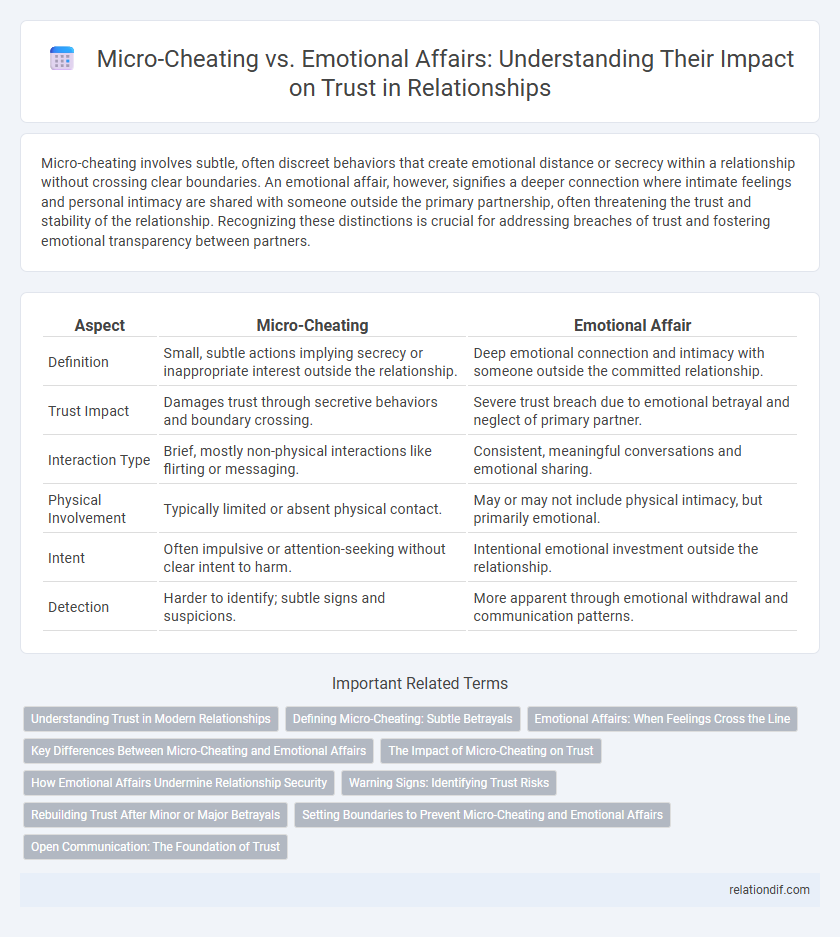Micro-cheating involves subtle, often discreet behaviors that create emotional distance or secrecy within a relationship without crossing clear boundaries. An emotional affair, however, signifies a deeper connection where intimate feelings and personal intimacy are shared with someone outside the primary partnership, often threatening the trust and stability of the relationship. Recognizing these distinctions is crucial for addressing breaches of trust and fostering emotional transparency between partners.
Table of Comparison
| Aspect | Micro-Cheating | Emotional Affair |
|---|---|---|
| Definition | Small, subtle actions implying secrecy or inappropriate interest outside the relationship. | Deep emotional connection and intimacy with someone outside the committed relationship. |
| Trust Impact | Damages trust through secretive behaviors and boundary crossing. | Severe trust breach due to emotional betrayal and neglect of primary partner. |
| Interaction Type | Brief, mostly non-physical interactions like flirting or messaging. | Consistent, meaningful conversations and emotional sharing. |
| Physical Involvement | Typically limited or absent physical contact. | May or may not include physical intimacy, but primarily emotional. |
| Intent | Often impulsive or attention-seeking without clear intent to harm. | Intentional emotional investment outside the relationship. |
| Detection | Harder to identify; subtle signs and suspicions. | More apparent through emotional withdrawal and communication patterns. |
Understanding Trust in Modern Relationships
Micro-cheating involves subtle actions that breach trust without overt infidelity, such as secretive texting or emotional flirting, which can erode the foundation of a relationship over time. Emotional affairs are deeper connections where one shares intimacy and emotional energy with someone outside the partnership, often leading to significant trust breakdown. Recognizing these behaviors helps partners navigate boundaries and reinforce trust in modern relationships.
Defining Micro-Cheating: Subtle Betrayals
Micro-cheating involves subtle behaviors that breach trust without overtly constituting an affair, such as secretive texting or emotional flirting. These actions create emotional distance and can erode relationship security by fostering doubt and suspicion. Unlike emotional affairs, micro-cheating lacks deep emotional involvement but still undermines commitment and transparency.
Emotional Affairs: When Feelings Cross the Line
Emotional affairs occur when one partner develops deep, intimate feelings outside their primary relationship, often blurring the boundaries of trust and loyalty. Unlike micro-cheating, which involves subtle actions like flirting or secretive texting, emotional affairs engage intense emotional investment, potentially leading to neglect of the primary partner. This breach of emotional exclusivity can cause significant damage to relationship stability and erode the foundation of trust essential for long-term commitment.
Key Differences Between Micro-Cheating and Emotional Affairs
Micro-cheating involves subtle actions like secretive texting or flirtatious behavior that undermine trust without physical intimacy, whereas emotional affairs entail deep emotional connections often accompanied by secrecy and detachment from the primary partner. Emotional affairs typically involve significant time investment, sharing of intimate thoughts, and emotional dependence not present in micro-cheating. Both behaviors damage relationship trust, but emotional affairs usually indicate a more intense breach of emotional boundaries.
The Impact of Micro-Cheating on Trust
Micro-cheating undermines trust by creating subtle doubts that accumulate over time, leading to emotional distance between partners. Unlike overt emotional affairs, micro-cheating behaviors often go unnoticed but erode the foundation of honesty and transparency crucial for relationship stability. Persistent micro-cheating can trigger insecurity and suspicion, significantly damaging the emotional bond and long-term trust.
How Emotional Affairs Undermine Relationship Security
Emotional affairs undermine relationship security by creating deep emotional intimacy outside the primary partnership, often leading to feelings of betrayal and distrust. Unlike micro-cheating, which involves small deceptive behaviors, emotional affairs involve sustained emotional connections that can replace or diminish the bond with a partner. This erosion of trust destabilizes the foundation of the relationship, increasing insecurity and vulnerability to further conflicts.
Warning Signs: Identifying Trust Risks
Micro-cheating involves subtle behaviors like secretive texting or emotional intimacy with someone outside the relationship, signaling trust erosion. Emotional affairs escalate these boundaries with deep emotional connections, often leading to betrayal and significant trust damage. Recognizing warning signs such as secrecy, emotional withdrawal, and unexplained time spent with others is crucial for preventing relationship breakdowns.
Rebuilding Trust After Minor or Major Betrayals
Rebuilding trust after micro-cheating or emotional affairs requires consistent transparency and genuine accountability to repair emotional damage. Establishing clear boundaries and open communication fosters gradual healing, enabling partners to rebuild a foundation of security and respect. Therapy or counseling can provide essential tools for addressing underlying issues and reinforcing commitment during this process.
Setting Boundaries to Prevent Micro-Cheating and Emotional Affairs
Setting clear boundaries in relationships helps prevent micro-cheating and emotional affairs by defining acceptable interactions with others. Establishing limits on emotional intimacy outside the partnership reduces risks of miscommunication and betrayal. Prioritizing transparency and mutual respect fosters trust and reinforces relationship security.
Open Communication: The Foundation of Trust
Open communication forms the foundation of trust by enabling partners to express feelings and boundaries clearly, reducing misunderstandings related to micro-cheating or emotional affairs. Discussing expectations transparently helps identify behaviors that may undermine trust, preventing emotional distance. Consistent dialogue fosters emotional intimacy, reinforcing commitment and mutual respect essential for a healthy relationship.
Micro-cheating vs emotional affair Infographic

 relationdif.com
relationdif.com